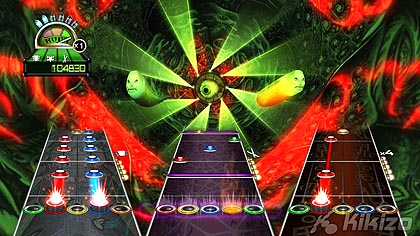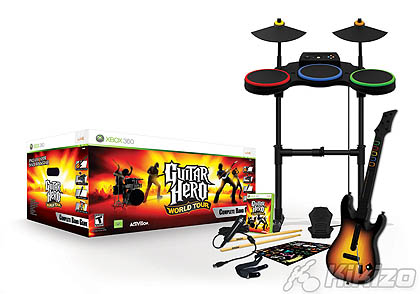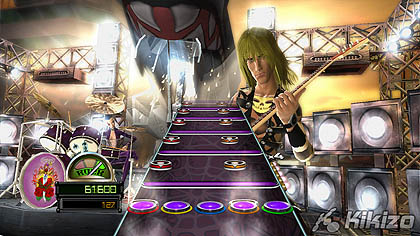Making Guitar Hero: Kai Huang Interview
We talk to RedOctane president and co-founder about his remarkable success story, Guitar Hero World Tour, the future of the series and the music game masterplan.
Page 4
Kikizo: Thinking big, what are the opportunities for this music distribution platform beyond World Tour?
Bright: We've really set a good foundation for that. I can see someday in the future, having an independent label or something, where we're actually cultivating artists that are online, and giving them enough tools in future versions of the game where they can make even more polished music that is possible now. Like say in the next version of Guitar Hero, there's lots of things we want to do that's going to allow you to make better and better music. And what's really cool right now is that the way we set it up, you're not only making music, you're also making gameplay at the same time. We kind of deal with the gameplay side of things - you don't need to worry about it, that's what the guys at Neversoft do, is meticulously play essentially each little midi note - you don't need to worry about it, it's cool, rock out, and then put it online and the gameplay just comes from that! Right now what you've seen is very robust - a great platform for us to build upon, and watch this community grow, so I'm really looking forward to the future.
Huang: GH Tunes to me is going to be a huge aspect of building that community and taking it to a whole new level. This will be the first time that people will be able to create and share their music with the 20 million-plus others who've bought Guitar Hero, and hopefully people who'll be buying Guitar Hero World Tour. And it's going to create the biggest platform for online music distribution in the world, when we launch it and it achieves the success that we expect it to have. That community of people are going to be on there creating music in GH Studio, sharing it, having themselves get ranked and saying "wow, people love my music!" - that is going to build a whole community in and of itself. It's not just limited to the game - it's everywhere, even outside of the game.
Kikizo: The market for this is obviously huge now, you mentioned $2bn which has to be something like 10% of the industry, so the way I see it, there's plenty of room for both this and Rock Band right now. But given that both now incorporate singing, where does it leaves SingStar, and indeed Lips? Is there room for all of it?
Huang: Right now, there is such an appetite for music in gaming, and it's so new to the mass market, that most of the products are going to be able to co-exist in the market. Over 20 million people have bought it, and that means probably 40-50 million people at least have seen it or experienced it, because it's a party game. But this is really just the tip of the iceberg; there are so many people who haven't even tried Guitar Hero yet. People are just learning about singing games, karaoke games, people are learning about drumming now, and people are gonna continue to have this appetite for it. So today, there's no question that there's plenty of room for a lot of players to exist. I think somewhere down the road, as in every space in every industry, the best products are going to filter to the top, and it's going to narrow down to the best products. I think we're clearly going in that direction with Guitar Hero World Tour, just taking everything to a whole new level. Guitar Hero as a franchise is the leading franchise in music gaming today, and we're just going to continue putting the bar higher and higher for ourselves.
Kikizo: What about the theme of it though? I mean, in Guitar Hero and Rock Band the emphasis is basically on rock. But there's plenty of band related stuff you could do that's outside of the rock genre. Is that something that you guys would want to look at next?
Bright: Possibly!
Kikizo: Er, well it would be a pretty large gap to not do something. It's just a case of who's going to do it first I guess. You wouldn't want to wait for the competition to do it first...
Huang: Well you know, if I think about music gaming, I put it onto two different axes. I think on one axis, let's call it the Y axis, we have genres of music. What we've been able to do with genres in Guitar Hero, is really focus on just rock. Even within rock, there's subgenres, but it's what we've focused on. And on the X axis, you can place instruments. First we started with the guitar, so in this grid, if this is music genre and this is instruments, all we have is one tiny box with Guitar Hero - rock music and guitars. Now we're adding new instruments with the drums, and the microphones for vocals - but we're still within the rock genre. So we've added two smaller boxes now. If you keep imagining where we could go, 90% or more of this grid, with different genres of music and different instruments, is still completely untapped. And although we've made no announcements on the type of stuff that we're going to do in the future, if you think of the music gaming space that way, it's still an open field, and as I said, it's really just the beginning.
Kikizo: Guys, thanks for your time.








 Satoru Iwata Video Interview - the late Nintendo president spoke with Kikizo in 2004 as 'Nintendo Revolution' loomed.
Satoru Iwata Video Interview - the late Nintendo president spoke with Kikizo in 2004 as 'Nintendo Revolution' loomed. Kaz Hirai Video Interview - the first of Kikizo's interviews with the man who went on to become global head of Sony.
Kaz Hirai Video Interview - the first of Kikizo's interviews with the man who went on to become global head of Sony. Ed Fries Video Interview - one of Xbox's founders discusses an epic journey from Excel to Xbox.
Ed Fries Video Interview - one of Xbox's founders discusses an epic journey from Excel to Xbox. Yu Suzuki, the Kikizo Interview - we spend time with one of gaming's most revered creators.
Yu Suzuki, the Kikizo Interview - we spend time with one of gaming's most revered creators. Tetris - The Making of an Icon: Alexey Pajitnov and Henk Rogers reveal the fascinating story behind Tetris
Tetris - The Making of an Icon: Alexey Pajitnov and Henk Rogers reveal the fascinating story behind Tetris Rare founders, Chris and Tim Stamper - their only interview? Genuinely 'rare' sit down with founders of the legendary studio.
Rare founders, Chris and Tim Stamper - their only interview? Genuinely 'rare' sit down with founders of the legendary studio. The History of First-Person Shooters - a retrospective, from Maze War to Modern Warfare
The History of First-Person Shooters - a retrospective, from Maze War to Modern Warfare